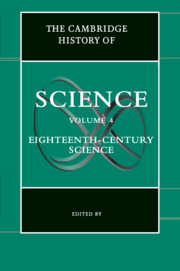Book contents
- Frontmatter
- 1 Introduction
- Part I Science and Society
- 2 The Legacy of the “Scientific Revolution”: Science and the Enlightenment
- 3 Science, the Universities, and other Public Spaces: Teaching Science in Europe and the Americas
- 4 Scientific Institutions and the Organization of Science
- 5 Science and Government
- 6 Exploring Natural Knowledge: Science and the Popular
- 7 The Image of the Man of Science
- 8 The Philosopher’s Beard: Women and Gender in Science
- 9 The Pursuit of the Prosopography of Science
- Part II Disciplines
- Part III Special Themes
- Part IV Non-Western Traditions
- Part V Ramifications and Impacts
- Index
- References
2 - The Legacy of the “Scientific Revolution”: Science and the Enlightenment
from Part I - Science and Society
Published online by Cambridge University Press: 28 March 2008
- Frontmatter
- 1 Introduction
- Part I Science and Society
- 2 The Legacy of the “Scientific Revolution”: Science and the Enlightenment
- 3 Science, the Universities, and other Public Spaces: Teaching Science in Europe and the Americas
- 4 Scientific Institutions and the Organization of Science
- 5 Science and Government
- 6 Exploring Natural Knowledge: Science and the Popular
- 7 The Image of the Man of Science
- 8 The Philosopher’s Beard: Women and Gender in Science
- 9 The Pursuit of the Prosopography of Science
- Part II Disciplines
- Part III Special Themes
- Part IV Non-Western Traditions
- Part V Ramifications and Impacts
- Index
- References
Summary
If there is one characterization of the Enlightenment that appears as a truism, it is the assertion that the Enlightenment adopted, extended, and completed the intellectual and social project usually characterized as the “Scientific Revolution,” a movement forged by Johannes Kepler (1571–1630) and Galilei Galileo (1564–1642), developed by René Descartes (1596–1650) and Gottfried Wilhelm Leibniz (1646–1716), and completed by Isaac Newton (1642–1727). In this view, the Enlightenment becomes both the inheritor of this legacy and its most persistent and dogmatic trustee. Because the Enlightenment is often seen as an age in which a “scientific paradigm” is accepted and transformed into “normal science,” the history of Enlightenment science has often been considered “a tiresome trough to be negotiated between the peaks of the seventeenth and those of the nineteenth century; or as a mystery, a twilight zone in which all is on the verge of yielding.” For many recent commentators even the twilight zone has been dispelled, revealing clear and close links between Enlightenment science and the “rational” imperatives of the Scientific Revolution, establishing the Enlightenment as the prototypical era in which scientific and instrumental reason became a defining characteristic of modern culture. These linkages between the Scientific Revolution, Enlightenment science, and a negative evaluation of modernity were first drawn by some intellectuals horrified by the destructiveness of modern civilization at the end of the Second World War. Max Horkheimer, for example, claimed in 1946 that “the collapse of a large part of the intellectual foundation of our civilization is … the result of technical and scientific progress.”
- Type
- Chapter
- Information
- The Cambridge History of Science , pp. 21 - 43Publisher: Cambridge University PressPrint publication year: 2003
References
- 4
- Cited by



